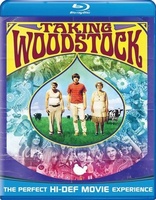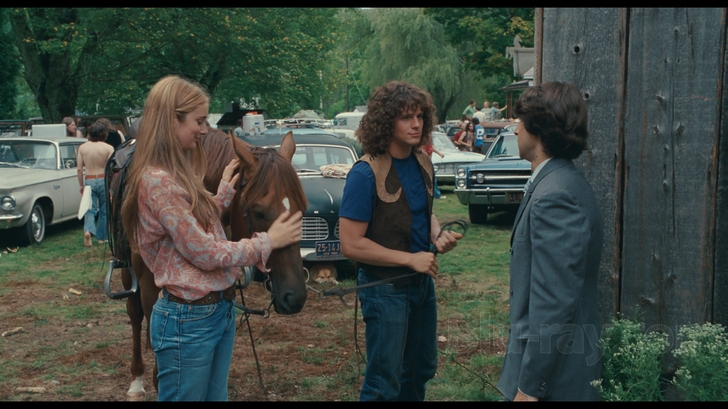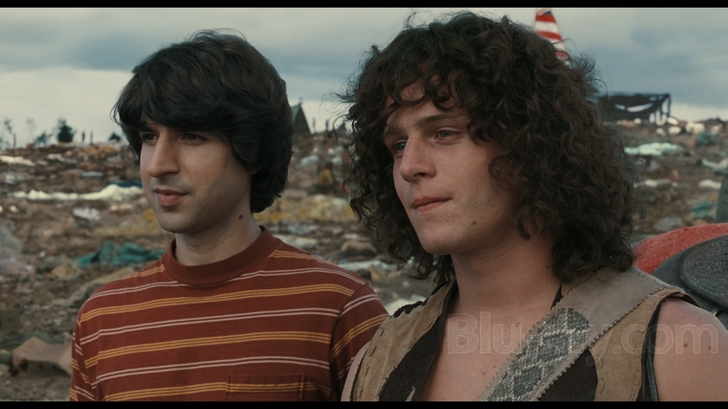Taking Woodstock Blu-ray Movie
HomeTaking Woodstock Blu-ray Movie 
Universal Studios | 2009 | 121 min | Rated R | Dec 15, 2009
Movie rating
6.5 | / 10 |
Blu-ray rating
| Users | 4.0 | |
| Reviewer | 3.5 | |
| Overall | 3.6 |
Overview
Taking Woodstock (2009)
A man working at his parents' motel in the Catskills inadvertently sets in motion the generation-defining concert in the summer of 1969.
Starring: Henry Goodman (I), Demetri Martin, Imelda Staunton, Kevin Chamberlin, Seth BarrishDirector: Ang Lee
| Comedy | Uncertain |
| Music | Uncertain |
| History | Uncertain |
Specifications
Video
Video codec: VC-1
Video resolution: 1080p
Aspect ratio: 1.85:1
Original aspect ratio: 1.85:1
Audio
English: DTS-HD Master Audio 5.1 (48kHz, 24-bit)
French: DTS 5.1
Spanish: DTS 5.1
Subtitles
English SDH, French, Spanish
Discs
50GB Blu-ray Disc
Single disc (1 BD)
BD-Live
Playback
Region free
Review
Rating summary
| Movie | 3.0 | |
| Video | 4.0 | |
| Audio | 4.0 | |
| Extras | 2.5 | |
| Overall | 3.5 |
Taking Woodstock Blu-ray Movie Review
More 'Hulk' than 'Ice Storm,' Lee's latest project fizzles...
Reviewed by Kenneth Brown December 15, 2009What is Taking Woodstock? It isn't a drama in the vein of director Ang Lee's darker tragedies; the film's saccharine sensibilities and rose-tinted nostalgia are too sugary sweet to elicit a lasting emotional response from its audience. It isn't a comedy befitting the comedians that fill its ranks; its characters' quirky personalities are amusing, as is its clash of hippie culture and mom-n-pop conservatism, but actual laughs are few and far between, making the bulk of the film an exercise in awkward pauses and meandering visits with a listless mob. So what is it exactly? Lee and screenwriter James Schamus' misguided attempt to diversify their canons? An overtly sappy jaunt through a simpler time? A historical dramedy suffering from an abnormally pronounced identity crisis? An underwhelming, albeit harmless bit of sentimental self-indulgence? An introduction to the free spirits who first witnessed a generation-defining shift in American culture? Sadly, Taking Woodstock is all of these things and more, meaning moviegoers will spend far more time locking down Lee's tone than enjoying the film itself.

Martin does a fine job, but his character is too anemic to bear the burden of the tale...
Based on Elliot Tiber and Tom Monte's 2007 memoir, "Taking Woodstock: A True Story of a Riot, a Concert, and a Life," Taking Woodstock opens in the fateful summer of 1969 and focuses on the unassuming citizenry of Bethel, New York, a small town forced to contend with the sudden influx of countless flower children arriving to attend the now-iconic music festival. At the center of the mounting madness is Elliot Tiber (Demetri Martin), a reserved young man determined to save his financially strapped parents' (Imelda Staunton and Henry Goodman) hotel. After acquiring the proper permits and convincing a wealthy land owner named Max Yasgur (Eugene Levy) to host the event, he meets festival organizer Michael Lang (Jonathan Groff) and begins to help his parents prepare for the coming hordes. Of course, as the rest of the town becomes aware of the deal and takes note of Woodstock's ballooning attendance, Elliot is ostracized and left to seek the counsel of several unique visitors including a transvestite named Vilma (Liev Schreiber), a Vietnam vet (Emile Hirsch), Lang's assistant (Mamie Gummer), a theatre troop leader (Dan Fogler), and a pair of on-the-go hippies (Kelli Garner and Paul Dano). Before long, Elliot begins questioning who he is, all but ensuring the festival will have as profound an effect on his life as those of the hundreds of thousands descending on his home town.
Taking Woodstock isn't a bad film by any means. Viewed alongside Martin Scorsese's first-hand account of the concert (as documented in Woodstock: 3 Days of Peace & Music), it provides an interesting peripheral account of the festival and its impact. Martin and his co-stars are convincing in their various roles, the film's veteran actors bring some much needed gravitas to the table, and even the filmmakers' most glorified characters -- Lang is practically presented as a wizened cultural messiah -- are blessed by impassioned, expressive performances. However, Schamus' script lacks narrative drive and his characters lack legitimate arcs. Lee's wandering camera follows suit, revealing little more than brief glimpses of the genuine human beings behind the story, substituting glassy eyed love and peace for anything resembling complex emotions. The people of Bethel appear angry, but their rage is strictly superficial, serving Lee's dreamy atmosphere rather than the truth. Tiber's soul searching is the product of convenience, not insecurity, fear, or loneliness. Lang's soft-spoken demeanor seems insincere, a wind-swept portrait of a decent man rather than a grounded portrayal of the festival's organizer. Don't misunderstand: on a scene by scene basis, such airy traits evoke the heart of Woodstock, the hippie movement, and the era. But on the whole, it rings false, leaving viewers with too many unanswered questions and unquenched thematic thirsts to resonate.
Lee also follows Tiber so closely that the festival itself, the very flame credited with drawing so many lost souls to its light, is rendered inert. Staying clear of the concert is certainly key to the film as conceived, but that doesn't mean it enhances the experience. On the contrary, it functions as a cinematic black hole; a disposable macguffin that attributes a cultural eruption to the gathering of a crowd, not the messages and music that attracted so many people in the first place. While it allows Schamus and Lee to hone in on the people of Bethel and Woodstock, it forgos their inspiration and motivations, inadvertently robbing many of the supporting characters of an opportunity to emerge from the shadows. Admittedly, such a decision might have worked if Tiber was more than a cypher for everything that occurs on screen. But his reaction to and acceptance of the peace and love swirling about his town isn't given much context, and his eventual affirmations seem like a secondary after thought. Hardly what I would expect from so many life-altering realizations. I have a feeling that anyone over forty, especially those who have a personal connection to the festival, will feel differently about the film, but I never felt connected to the tale. I enjoyed the characters and their company -- I even wanted to know where Woodstock would leave each of them -- but I had a difficult time actually caring about their plights and encounters. While I wouldn't label Taking Woodstock a waste of time, I also wouldn't suggest anyone rush out to buy the film without having seen it first.
Taking Woodstock Blu-ray Movie, Video Quality 

Evocative of Scorsese's 1970 documentary, Woodstock: 3 Days of Peace & Music, Taking Woodstock revels in natural lighting, soft focus photography, and intentionally degraded establishing shots. Universal's 1080p/VC-1 transfer preserves Lee's vision, forgoing unnecessary artificial sharpening to faithfully reproduce the director's every hazy edge and swampy shadow. Colors, while muted on the whole, are rich and lifelike, lovingly rendering the earthy hues and natural skintones that bolster Eric Gautier's palette. Blacks, though more akin to charcoal than ink, are adequately resolved and more than appropriate for the subject at hand. Detail waxes and wanes as readily as the festival itself -- a slight waxiness even suggests a touch of noise reduction has been applied -- but remains fairly consistent throughout. Sharp? Not in a traditional sense. Satisfying? Quite so, particularly in light of Lee's intentions. It helps that the studio's technical efforts are so sound. Artifacting, banding, ringing, aliasing, and other digital nonsense are never an issue, and the image is both clean and stable. A fine representation of its director's dreamscape, Taking Woodstock's video presentation should elicit praise from former hippies and young filmfans alike.
Taking Woodstock Blu-ray Movie, Audio Quality 

Universal's immersive DTS-HD Master Audio 5.1 surround track is just as impressive, albeit not for the reasons newcomers might expect. Since Taking Woodstock lingers on the outskirts of the festival, rarely venturing near the main stage, music doesn't play the role it may have in another director's film. Instead, the rear speakers are tasked with creating a convincing soundfield; one haunted by the distant anthems of rock gods, but never devoted to their melodies. The faint sounds of the concert drift in from every angle, offering listeners a remarkably subtle, essentially realistic experience. That being said, the result is often undeniably front-heavy. Because Lee largely abandons the festival's music to focus on the three days of peace his characters are peddling, the film isn't the sonic showcase people are probably anticipating. Thankfully, dialogue is clear and intelligible, prioritization is spot on, and nuanced LFE support adds a welcome bit of weight to passing vehicles, pressing crowds, and some of Bethel's more heated encounters. The track certainly isn't going to wake the neighbors, or anyone sleeping upstairs for that matter, but it is a rewarding bit of time travel, effectively enveloping those in its vicinity and transporting them to a quaint New York township in 1969.
Taking Woodstock Blu-ray Movie, Special Features and Extras 

The Blu-ray edition of Taking Woodstock isn't spilling over with special features, but it does offer a decent collection of supplements fans of the film are sure to enjoy. The best of the bunch, a breezy Audio Commentary with director Ang Lee and writer James Schamus, is brimming with candid observations, personal anecdotes, and extensive details about the production. The pair rarely run out of things to say and their conversation remains both engaging and amusing throughout. Six Deleted Scenes (HD, 11 minutes) are just as good, and could have easily found a welcome home in the film. Likewise, Peace, Love and Cinema (HD, 20 minutes) is a fairly generous production documentary that serves up a satisfying series of interviews with every key member of the cast and crew. Some participants are a tad annoying (Emile Hirsch chief among them), but they manage to inject an interesting perspective into the proceedings that was missing from Lee and Schamus' commentary. The only hit-or-miss supplement is No Audience Required: The Earthlight Players (HD, 4 minutes), a somewhat shallow look at some of the film's supporting characters. Rounding out the package are Universal's usual assortment of Blu-ray exclusive features: My Scenes bookmarking, BD-Live Functionality, and an unsightly News Ticker.
Taking Woodstock Blu-ray Movie, Overall Score and Recommendation 

To my dismay, Taking Woodstock isn't a life-changing cinematic experience in the vein of the festival it follows. Instead, director Ang Lee disappoints, failing to establish the film's identity or deliver the wry humor Schamus' script seems to require. Universal's Blu-ray release is much better, delivering a faithful video transfer, an immersive DTS-HD Master Audio track, and a solid collection of supplemental features. I would recommend seeing the film before committing to a purchase, but fans will be pleased with the treatment Lee's ode to peace and love has received.
Similar titles
Similar titles you might also like

A Mighty Wind
Warner Archive Collection
2003

Popstar: Never Stop Never Stopping
2016

American Dreamz
2006

Rhinestone
1984

Dave Chappelle's Block Party
2005

CB4: The Movie
1993

Hamlet 2
2008

Duets
2000

That Thing You Do!
1996

For the Boys
1991

Josie and the Pussycats
20th Anniversary Edition
2001

The Monkees: The Complete Series
Limited Edition to 10,000
1965-1969

Detroit Rock City
1999

Soul Men
2008

Hairspray
1988

Poms
2019

The Rutles: All You Need Is Cash
1978

Girl Most Likely
2013

Peace, Love & Misunderstanding
2011

Walk Hard: The Dewey Cox Story
2-Disc Unrated Edition
2007